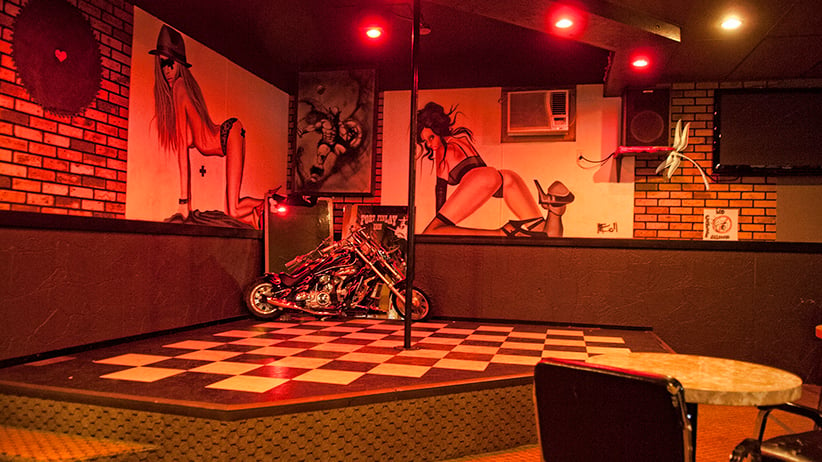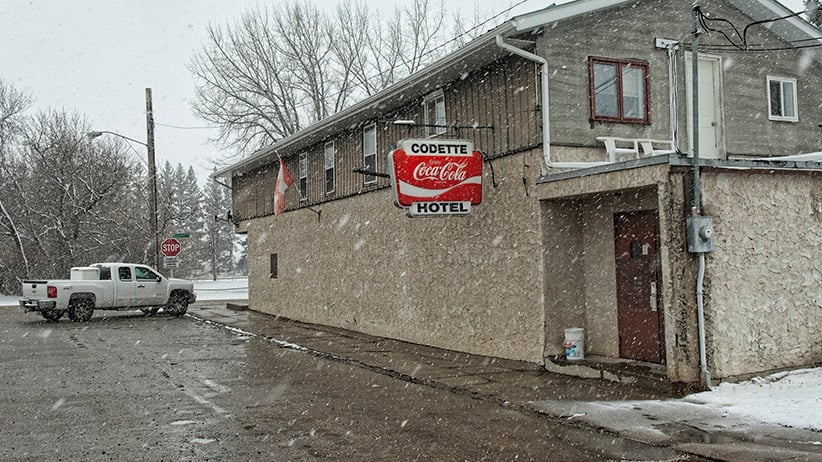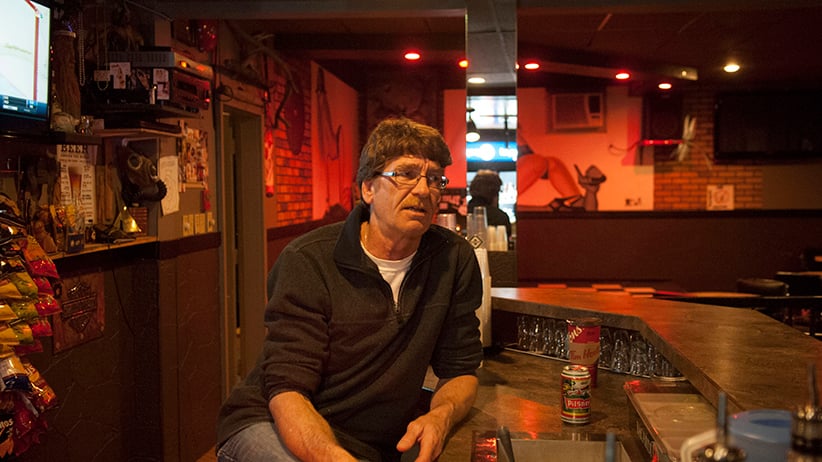The last true strip club in Saskatchewan
Fear of organized crime led to a ban on Saskatchewan’s strip clubs. But there was really only one: the small-town Codette Hotel.
Don Verstraeten manager of Codette Bar looks at an empty stage and a bar devoid of patrons since provincial legislation banned strippers. Codette, SK. (Photograph by Nayan Sthankiya)
Share

Codette (pronounced “Cadet”) is a small community in northern Saskatchewan, 10 km south of Nipawin. Driving down its main road—which in late April, truly the cruellest month here, is still sheathed in ice—you might conclude it’s the quietest place on Earth. That is, until you step into the Codette Hotel, a tiny bar at the end of the street.
Formerly the province’s best-known strip club, tonight it is virtually empty. (Contrary to what its name suggests, the hotel does not offer lodging, though its upstairs apartment once served as a guest room and dressing area for visiting dancers.) Its owner, a wiry man in his early 50s named Don Verstraeten, who looks a lot like Bryan Cranston of Breaking Bad, says that for a little more than a year, the Codette Hotel “was a gong show.” Two strippers danced on its small stage every week, packing the place with locals and out-of-towners alike; businessmen from nearby Melfort and Prince Albert.
Now the bar is more of a strip museum than a strip club. Its tables are unoccupied and its single stripper pole is unused. Autographed headshots of the club’s former entertainers—mostly women from cities in Saskatchewan and Alberta who came to Codette specifically to dance—decorate the wall beside the bar. Verstraeten, who goes almost exclusively by “Abner” (a childhood nickname) expounds on each photograph in detail; it’s clear he has a genuine fondness for the young women pinned to his wall. But it is unlikely he will be seeing them anytime soon.
The reason is simple: In March, Saskatchewan Premier Brad Wall’s government announced a major change to the province’s liquor laws, one that has effectively outlawed stripping in bars. More specifically, Wall’s government waffled on a decision he made barely a year ago, in January 2014, in which he ended a decades-long prohibition on stripping in licensed establishments. Wall’s initial announcement legalized the practice, but pressure from groups who believe strip clubs promote human trafficking provoked a change of policy by the provincial government. Wall has reversed his original reversal at lightning speed; he hath giveth, then re-taken away.
“I believe that the government of Saskatchewan made a mistake last year when we allowed licensed strip clubs in the province,” Wall told the press in March. According to Jim Engel, vice-president of corporate services with the Saskatchewan Liquor and Gaming Authority, there is no definitive proof that the province saw an uptick in organized crime or human trafficking in the short period stripping was legal in its bars. But, he says, the government believed “the linkage between organized crime and this particular industry” was “well-established” enough to outlaw the practice.

The only nudity-friendly exception to the new legislation applies to once-a-year charity events, where stripping will be permitted in licensed venues as long as event organizers acquire a special permit and the night’s proceeds go to charity. Otherwise, stripping (which in Saskatchewan terms has always disallowed full-frontal nudity; strippers wore “pasties” or nipple tassels, and covered the bottom of their genitals) is relegated to non-licensed establishments. And a dry strip club, one can easily imagine, is not a sustainable one. The only known dry club in Saskatchewan—an establishment called Dancers 2000, in Regina—is no longer in operation.
Which means that Canada’s famously flat prairie province is also famously straight-laced. (In fact, if you are a resident of Saskatchewan, it is now officially easier to solicit birthday wishes from the premier than from an exotic dancer; the Saskatchewan government’s website offers instructions on how to “arrange greetings from Brad Wall for a birthday or anniversary.”) This new reality may not mean much in a province that doesn’t and never did offer a plethora of regulated adult entertainment. But it means a great deal to the Codette Hotel, whose business has dried up in a matter of weeks. In an effort to turn things around on a recent weekend, Verstraeten concocted an edited version of the bar’s usual striptease, one reminiscent of the 1983 film Flashdance—a movie set in an alternate universe where the coolest strip club in town offers no stripping at all. (Instead, the dancers do a lot of complicated aerobics in leotards.)
Verstraeten’s original plan was for Lexxi Lee, one of the bar’s more popular dancers, to serve drinks and perform in a bikini. Instead, he says, she came out in “a short pair of shorts and a racy looking top.” In other words, Flashdance apparel. But Flashdance, it turns out, does not fly in the Prairies, at least not in Codette. Only a handful of people showed up that Friday, on what would have been an exceedingly busy night in the nudity-friendly days. “Nobody cares about bikini girls,” says Verstraeten, with weary wisdom. “They want to see a stripper.”
Verstraeten, whose bar apron is adorned with his version of a teddy bear—a plush penis —feels strongly that the Wall government’s anti-stripping stance isn’t morally driven, but a cynical political move to curry favour with senior voters in the coming provincial election. The suggestion, for example, that his strip bar could be affiliated with organized crime confounds him. “I’m the only little club [in the province],” he says “and I’m sure as hell not run by the Hells Angels.” Without irony, he adds: “I’ve taken some of these girls to my mum and dad’s for supper.”

That said, no strip club is a monument to virtue. Verstraeten’s bar may have zero organized-crime affiliation, but gangs like the Hells Angels in Montreal have been known to operate strip clubs. Richard Lepp, a retired Saskatoon police officer who’s been vocal on the stripping issue in Saskatchewan, said that in his time on the force (1978-2006) he believed “the majority of booking agencies in Canada handling the contracts of exotic dancers had direct ties to organized crime.”
What’s more, Canadian men in general have a unique reputation for shady strip-club behaviour. In 2008, a Las Vegas stripper who had recently worked in Calgary penned a column in Las Vegas Weekly excoriating Calgarian strip-club patrons for allegedly participating in a ritual called the “loonie toss,” in which a stripper sticks a single loonie to her genitals and audience members fling their own loonies at the dancer in an attempt to knock the original off her body.
It’s this type of debasing image that seems to fuel a large part of the animosity toward stripping in Saskatchewan. When Rick Parkyn, a pastor to 1,500 parishioners, spoke out against a proposed strip club at a Regina city council meeting in January (the proposal was defeated), his objection to licensed strip clubs apparently had little to do with religion and everything to do with women’s rights. “I’m a father of three daughters and it would break my heart to think one of my daughters could be in a strip club being paid by men my age to take their clothes off,” he says.
But the state of Parkyn’s heart on these matters may not be relevant to strippers themselves, some of whom might be in danger under Wall’s new legislation. Lindsay Krestianson, one of the Codette Hotel’s main bartenders, says she has heard stories of strippers doing private bachelor parties without security since the change in the law. “We’ve got girls who say they were more comfortable coming here because it was a little bit more of a relaxed environment,” she says. “Nobody ever got out of line with the dancers; if they did they were kicked out immediately.”
“Without rules that allow an agency or club to supply these girls with bouncers—[the girls] might be putting themselves in a way riskier situation,” says Mikayla Korman, an exotic dancer based in Calgary who goes by the stage name Dallas. She so appreciated the Codette Hotel’s “small town feel” during the “nude” days that she used to make the nine-hour drive to dance there. “I never felt unsafe,” she says. “One time a customer threw a quarter at me [and] everybody, including the other patrons, spoke to him. No fight broke out.”
Krestianson, a slight woman with straight brown hair, used to operate heavy machinery—loaders and scrapers in the road-building industry—before she took up bartending. She says the sexism and lewdness she experienced in that job far surpassed any inappropriateness she witnessed at the strip bar. “I was getting poisoned by testosterone. It was like second-hand smoke.” Her point? Misogyny is not relegated to, or even necessarily more potent in the adult entertainment industry. If you think it is, you’re living in a world as divorced from reality as Flashdance. In the real world, most laws drafted to protect women have one thing in common: they seldom do.
The Codette Hotel, meanwhile, seems headed swiftly for extinction. Verstraeten is well aware of this circumstance, which is why he is considering bringing new, legal entertainment to the bar—maybe a karaoke machine, or a hypnotist. But without striptease, he acknowledges, things in Codette will never be the same. “It’s so sad,” he says, “because people would come from all over . . . I was the one and only.”